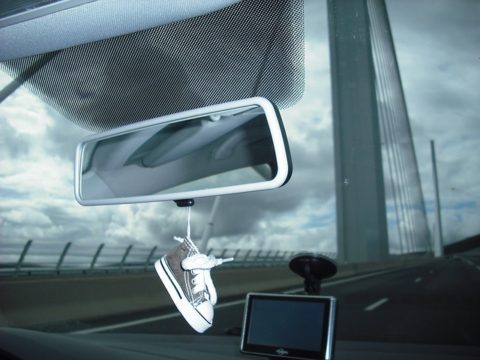Objects Hanging from the Rearview Mirror are Illegal in Michigan
Many people hang an object, like an air freshener or trinket, from the rearview mirror of their vehicle. Little do they know that that object gives the police the right to issue a ticket.

Traffic Stop for Obstructed View
It is that time of year to show the world that you have graduated from high school by proudly displaying the tassel on your graduation cap from your rearview mirror. A recent law upheld by the Michigan Court of Appeals may have you thinking twice about doing so. The Michigan law on obstructed view bans dangling objects obstructing the driver’s vision and tinted windows. If you decide to display your tassel, you may find yourself in need of a Michigan Criminal Defense Attorney. Many police officers and prosecutors believe hanging an object from your rearview mirror in Michigan is illegal.
Recently a Farmington Hills Police Officer pulled over a Novi man for obstructed view by having an air freshener hanging from his review mirror. The officer noticed the driver throw something out of the window and later observed a syringe on the ground beside the car. The man was subsequently charged with possession of heroin. The court had dismissed the charge stating that the search was based on bad law. The prosecutor appealed, and the court of appeals reversed the circuit court judge’s decision. The prosecutor will now be perusing the criminal charges against the man.
Hanging Religious Items from a Rearview Mirror is Illegal
People who feel strongly about their religion or are devout practitioners might want to keep a religious symbol or item in their view while driving. Clients of LEWIS & DICKSTEIN, P.L.L.C. have told our attorneys that a religious item hanging from the rearview mirror gives them a sense of protection and comfort. So, is hanging a religious object, such as a cross, from a rearview mirror protected by the 1st Amendment guarantees of religious freedom and freedom of speech? No, it is not a violation of the 1st Amendment.
Dangling religious items from a rearview mirror could potentially interfere with a driver’s ability to operate their vehicle safely. The primary concern is that objects hanging from the rearview mirror can obstruct the driver’s view of the road and surrounding traffic. This obstruction can limit the driver’s visibility, potentially causing distractions and increasing the risk of accidents.
In Michigan, laws and regulations are in place to prevent objects from obstructing the driver’s view. These laws are typically not specific to religious items but apply to any object that may impede the driver’s vision. The 1st Amendment is not violated by traffic regulations specifically tailored to ensure safe driving conditions.
Drivers need to maintain a clear and unobstructed view of the road at all times to ensure their safety and the safety of others. If an item, religious or otherwise, hanging from the rearview mirror is deemed to obstruct the driver’s view, it may be considered a violation of the law. It is advisable to refer to local traffic regulations or consult with local authorities for specific guidelines in your jurisdiction.

Defending Against Evidence Resulting from a Traffic Stop
A skilled criminal defense attorney will look at all available avenues for attacking the prosecution’s evidence obtained from a traffic stop. When officers claim they had reasonable suspicion to stop someone’s car, a defense attorney can employ various strategies to challenge the validity of the stop. Here are some common approaches:
- Lack of Specific and Articulable Facts: The defense attorney may argue that the officer did not possess “specific and articulable facts” that justified the reasonable suspicion required for a traffic stop. They can question the officer’s testimony and challenge whether the facts relied upon were truthful and sufficient to warrant the stop.
- Racial or Profiling Bias: If evidence suggests that the traffic stop was motivated by racial profiling or bias, the defense attorney can argue that the stop was not based on reasonable suspicion but on an impermissible factor. The defense lawyer must present evidence such as statistics, prior incidents, or witness testimony to support this claim.
- Inaccurate Information or Mistaken Identity: The defense attorney can argue that the officer’s information was incorrect or that the officer mistakenly identified the defendant’s vehicle. This may cast doubt on the validity of the reasonable suspicion for the traffic stop. Suppose someone calls the police and submits an anonymous report that an object is illegally dangling from a car’s rearview mirror in Michigan. The police might accidentally stop your car because they mistake it for the one referenced in the call to their station.
- Lack of Observable Traffic Violation: If the officer claims the traffic stop was based on a traffic violation, the defense attorney can challenge the officer’s ability to observe the alleged violation. They can question whether the officer had a clear and unobstructed view or whether other factors could have influenced the officer’s perception. Suppose the officer did not personally witness the traffic violation or engaged in conjecture. In that case, a judge might rule the stop was illegal and suppress any evidence arising from the stop as “fruit of the poisonous tree.”
- Fourth Amendment Violation: The defense attorney can argue that the traffic stop violated the defendant’s Fourth Amendment rights protecting against unreasonable searches and seizures. They may contend that the officer’s actions went beyond the scope of a lawful traffic stop or that the stop was prolonged without sufficient justification. For example, if officers call for a K9 to search for contraband and the duration of the traffic stop is unreasonably extended, any evidence obtained should be suppressed.
- Suppression of Evidence: If the defense attorney successfully challenges the validity of the traffic stop, they can move to suppress any evidence obtained as a result of the stop. This may include physical evidence, statements made by the defendant, or any other information obtained during or after the stop. Suppose your vehicle is stopped in Michigan, and the officer claims your view was obstructed by a small silver cross hanging from the rearview mirror by a thin wire. While the car is stopped, officers observe something illegal in the backseat, such as a pistol. If the judge rules the item did not obstruct your view, the officer’s observation of the contraband in your car must be suppressed. Although dangling an object from a rearview mirror is illegal in Michigan, the item might be so small that a judge will rule it was not an obstruction or distraction.
It’s important to note that the specific strategies a defense attorney uses may vary depending on the circumstances of the case. Consulting with a qualified attorney, such as the lawyers with LEWIS & DICKSTEIN, P.L.L.C., is crucial to determine the best approach for your situation.

Nationally Recognized Michigan Criminal Defense
If you find yourself being charged with an obstructed view and you would like a free consultation with a Michigan criminal defense lawyer who is nationally recognized and dedicated to the passionate, fearless, and tireless defense of those charged with State and Federal misdemeanor and felony offenses, please call LEWIS & DICKSTEIN, P.L.L.C. We look forward to hearing from you; we have the best Michigan criminal defense team that will fight for you every step of the way.
Call us today at (248) 263-6800 for a free consultation or complete an online Request for Assistance Form. We will contact you promptly and find a way to help you.












